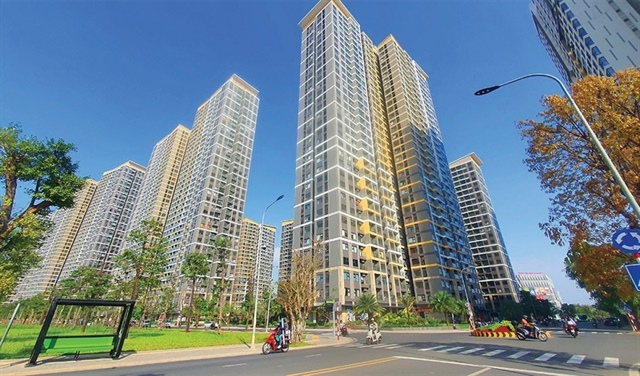The safety and well-being of residents are CapitaLand's priority
The safety and well-being of residents are CapitaLand's priority
Chen Lian Pang, CEO of CapitaLand Vietnam, talked with VIR's Ngoc Huyen about the incidental damage occurring to six houses surrounding the D'Edge project during the construction of a basement. In the aftermath, CapitaLand was forced to halt progress to reach a settlement with house owners and the local authorities.
Foundation works at the D’Edge project has damaged some surrounding houses. How do you feel about this matter?
The safety and well-being of residents are our priority, and we are working closely with the authorities and third-party experts to investigate the matter.
This concerns me a great deal, as if it is not resolved properly, it may affect our future developments and the overall investment outlook of Vietnam. Currently, based on the contractual terms between the developer and the main contractor, the developer has handed over the site to the appointed contractor for site management. Thus, all external parties, including the developer, would have to obtain permission to enter the site.
Understanding that the site is surrounded by other structures, the developer has anticipated that the surroundings would be affected by the construction to a certain extent. Thus, insurance has been purchased to cover matters.
Currently, the construction work has damaged six houses within the surroundings. Based on past experience, such collaterals are inevitable due to the nature of excavation work, especially during basement construction. As an experienced international developer, we have taken preventive measures to minimise such issues where possible.
Can you please elaborate about this insurance policy you mentioned?
We always ensure that insurance is purchased prior to starting construction work. Despite the cost, we make sure there is insurance in place in just such an eventuality. Usually, this will involve a third party surveyor for assessment. Before commencing major works, pictures and notes will be taken to document the existing physical conditions of the surrounding houses at that point in time. Such documents are then used as basis for comparison if issues occur.
What construction methods does CapitaLand employ to erect retaining walls? Are there any monitoring devices available for such purposes?
For basement construction, retaining walls are typically designed to hold and prevent the collapse of soil from neighbouring sites. Together with monitoring devices installed around the construction site, these devices provide feedback to the technical team for monitoring and ensuring construction safety. At the moment, the construction of the D’Edge project stays within the safety requirements stated in its approved design. We will continue to monitor this to ensure that we minimise the impact of the construction to neighbouring properties.
Have you received any feedback from the six affected houses?
To date, five out of six affected house owners have accepted the conditions offered by the developer to repair the damage caused, leaving only one house. The owner of this property did not accept the developer’s offer and requested a much higher compensation for the damage than the other five owners. In addition, the owner has only allowed entry by an independent surveyor recently, but they have yet to agree on the scope of the work to be done, which is essentially blocking progress.
As the investigation is still ongoing, minimal conclusions can be made. However, as an international developer with a track record of more than 20 years, I would like to emphasise that we have done our best to address the situation and can only hope that the public will trust us. In addition, I would like to share that we do have some documents to show the actual conditions of the houses prior to the construction works. Furthermore, meetings, appeals, and documents related to this issue have been documented.
Can you share the conclusions of the independent surveyor?
Currently the investigation is ongoing and we do not have any conclusions yet, as the last home owner just gave permission to enter his house and they are still negotiating the scope of the damage and the work to be done.
We stand by our principles and our processes. We have 12 successful projects in Vietnam and have even more in the pipeline—we remain steadfast in our wish to build communities and improve the standards of living in Vietnam.
Due to this issue, the affected owners have asked to halt the foundation works. Will this worsen the situation and compromise the safety of surrounding residents?
My personal opinion is that to protect the safety of the surrounding residents, the construction should continue and the walls of the basement should be completed. If construction is stopped before the walls are completed and the rainy season approaches, the rain will loosen up the soil, affecting the safety and structural integrity of surrounding houses.
Has CapitaLand faced similar issues overseas and how did you deal with it?
Such issues arise from basement excavation works everywhere in the world. This is true for the central business district or congested city areas, too. The process is pretty much standard: a third party is invited to assess the damage, after which the sides negotiate and pay compensation.
When do you plan to continue the basement construction?
As much as we would like to proceed to keep on schedule, we have to wait for permission from the local authorities.Keeping the surrounding residents’ safety in mind, we have written to the Ho Chi Minh City Department of Construction to withdraw its suspension order and allow us to continue the work.
We want to highlight that we are doing our best to resolve this issue. We are willing to settle at a reasonable amount. We hope the owner will consider the safety implications of stopping the construction and work with us to resolve this issue.

























